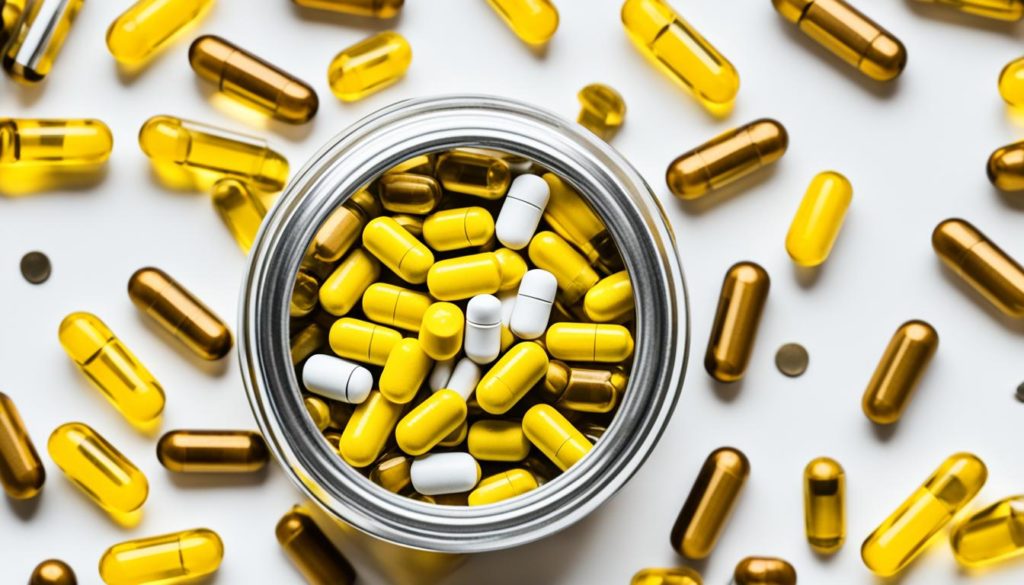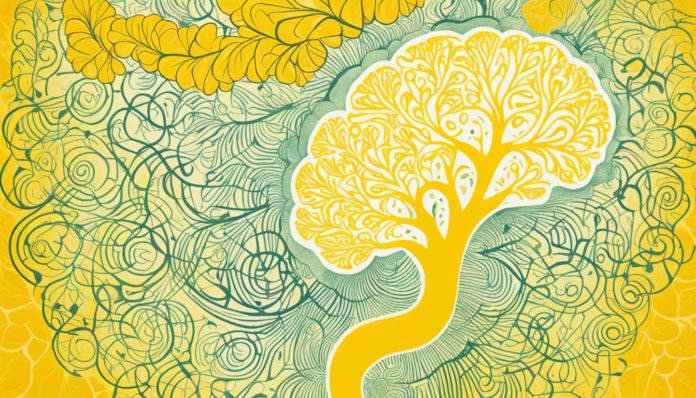Ginkgo Biloba is known as a natural booster for the brain. It comes from ancient China and is still widely used today. People love it for its help with memory and brain power. Let’s dive into what makes this plant so special.
Key Takeaways
- Ginkgo Biloba is a leading choice among herbal remedies for cognitive support.
- It originates from ancient China and has a rich history of use.
- The plant is known for its ability to enhance memory and cognitive function.
- Modern health practices continue to utilize Ginkgo Biloba for its numerous benefits.
- Understanding its uses and benefits can help make informed health and wellness decisions.
Introduction to Ginkgo Biloba
Ginkgo Biloba is well-known for its use in ancient herbal medicine. It’s admired around the globe for its unique features and long history. As a key part of traditional Chinese medicine, the Ginkgo Biloba tree now plays an essential role in modern botanical supplements.

Origin and History
The Ginkgo Biloba tree, a “living fossil,” is over 200 million years old. This old tree species has weathered major climate changes and thrived. Its lasting presence in history marks it as strong and enduring. Ancient Chinese records show it was used in medicine. It helped treat many health issues and boost wellness.
Botanical Characteristics
The Ginkgo Biloba tree has fan-shaped leaves and a special way of branching out. It loves temperate climates and is incredibly long-lived, with some trees reaching over a thousand years old. Its resistance to pests and diseases makes it a top pick for botanical supplements. Plus, its leaves are packed with helpful substances like flavonoids and terpenoids. These contribute to its healing effects.
Here’s how the Ginkgo Biloba tree compares to other herbal plants:
| Attribute | Ginkgo Biloba Tree | Other Herbal Plants |
|---|---|---|
| Longevity | Over 1,000 years | Varies, typically 5-70 years |
| Leaf Shape | Fan-shaped | Various shapes |
| Medicinal Compounds | Flavonoids, Terpenoids | Alkaloids, Anthocyanins (varies) |
| Climate Tolerance | Wide range (temperate) | Dependent on species |
Health Benefits of Ginkgo Biloba
Ginkgo Biloba is famous for its health benefits, especially for the brain. It’s made from an ancient tree. This extract helps with mental clarity and is a top choice for brain health supplements.
Improving Cognitive Function
Ginkgo Biloba is known to boost brain function. Studies show it improves things like thinking, memory, and attention. People who want natural brain supplements often pick Ginkgo Biloba to make their minds sharper and healthier.
Enhancing Memory and Focus
Ginkgo Biloba is great for improving memory and focus. It helps with recalling information and staying concentrated. Research proves that using Ginkgo Biloba regularly can enhance mental clarity. It’s helpful for those wanting to improve focus or battle memory loss with age.

| Health Benefit | Ginkgo Biloba’s Role | Supporting Study |
|---|---|---|
| Memory Enhancement | Boosts recall and mental clarity | Journal of Psychopharmacology (2015) |
| Focus Improvement | Enhances concentration levels | Medical Science Monitor (2011) |
| Overall Cognitive Function | Aids in executive processing and working memory | Human Psychopharmacology (2017) |
Ginkgo Biloba for Cognitive Support
Ginkgo Biloba is known for its potential to protect the brain. It plays a key role in battling cognitive disorders. We will explore how it works and the research backing its benefits.
Mechanisms of Action
Ginkgo Biloba boosts cognitive functions through its neuroprotective effects. Its active ingredients, like flavonoids and terpenoids, enhance blood flow to the brain and offer antioxidant advantages. This helps keep nerve cells healthy and supports brain health.
It also works with the neurotransmitter systems, especially the cholinergic system involved in memory and learning. This is crucial for easing symptoms of cognitive disorders such as Alzheimer’s disease and dementia.
Scientific Studies
Many studies have looked into Ginkgo Biloba and its impact on the brain. A key research showed its extract improves cognitive function and daily living in those with mild cognitive issues and dementia.
The table below provides a summary of important findings from different studies:
| Study | Focus | Results |
|---|---|---|
| Bauer et al. (2006) | Effects on Alzheimer’s Disease | Improvements in cognitive function at 240 mg daily dosage |
| Weinmann et al. (2010) | Prevention of Cognitive Decline | Efficacy in MCI and dementia patients |
| Janssen et al. (2011) | Neuropsychiatric symptoms | Reduction in neuropsychiatric symptoms with comparable adverse events to placebo |
These studies present strong proof of Ginkgo Biloba’s benefits for the brain. Yet, its role in halting cognitive decline needs more exploration.
Ginkgo Biloba Supplements: What You Need to Know
Exploring Ginkgo Biloba supplements can feel overwhelming. There are many products out there. It’s important to understand the types and how to pick high-quality options. This will help you get the most out of these supplements.
Types of Ginkgo Biloba Supplements
There are different forms of Ginkgo Biloba supplements. This makes it easier for everyone to find one that suits them. Here’s a brief rundown:
- Capsules and Tablets: These are the most common forms, offering a convenient way to ingest the supplements with precise dosages.
- Liquid Extracts: Suitable for those who have difficulty swallowing pills, these extracts can be added to drinks or taken directly.
- Teas: Infusing Ginkgo leaves in hot water provides a natural way to consume the supplement, although the potency may vary.
How to Choose the Right Supplement
To pick the best Ginkgo Biloba supplements, consider several factors. This ensures you get herbal supplement quality:
- Check for Standardization: Look for products standardized to 24% flavone glycosides and 6% terpene lactones to ensure potency.
- Research the Brand: Choose reputable brands with transparent manufacturing processes and positive reviews.
- Read Labels Carefully: Avoid supplements with unnecessary fillers, additives, or artificial ingredients.
- Verify Testing and Certification: Select products that have been third-party tested for purity and potency.
Knowing these factors helps you find high-quality supplements. This ensures you make good choices for your health. Check out herbal supplement quality standards to be well-informed.
Ginkgo Biloba Extract: Uses and Benefits
Learning about Ginkgo Biloba extract is key for better health supplement choices. The EGb 761 Ginkgo extract is especially important for its quality and effect. It ensures the same health benefits in every dose.
Standardized Extracts
EGb 761, a standardized Ginkgo extract, keeps active ingredients at specific levels. This guarantees every dose has the same health effects. It’s known for improving memory and focus.
Forms of Ginkgo Biloba Extract
Ginkgo Biloba extract comes in different shapes, each with unique benefits. Let’s look at a few:
- Tablets and Capsules: These are easy to use and dose accurately. They often have EGb 761 extract, ensuring reliable benefits.
- Liquid Extracts: Liquid forms are quick to work and easy to mix with drinks. They’re chosen for their speed and efficiency.
- Teas: Ginkgo Biloba tea is a traditional method with a milder dose. Yet, it’s still a favored way to support daily health.
Knowing about the different Ginkgo Biloba extract forms helps in picking the best one. Each form suits different needs and health objectives. For more on nutrition, see info on essential minerals for well-being.
Ginkgo Biloba Uses in Traditional Medicine
Ginkgo Biloba has been a key healing herb for centuries. It bridges ancient traditions with modern health practices. This shows its value in both traditional Chinese medicine and today’s herbal therapy.
Historical Uses
In the past, Ginkgo Biloba was a star in Chinese medicine for its healing effects. It boosted brain function and helped with breathing problems. It was known for increasing blood flow and fighting memory issues, earning great respect in old medical texts.
Contemporary Applications
Ginkgo Biloba’s uses have grown in modern times. It now helps with brain health, fights stress, and boosts brain performance. Recent studies support these old beliefs, making Ginkgo a popular choice in health supplements today.
Ginkgo Biloba Dosage: Guidelines for Use
It’s important to know how much Ginkgo Biloba to take to get its benefits safely. Here, we’ll cover how much adults should take. We’ll also look at what different groups of people need to consider.
Recommended Dosage for Adults
Adults should take 120 to 240 milligrams of Ginkgo Biloba every day. It’s best to split this amount into two or three doses throughout the day. For the best results, follow these dosage guidelines closely:
- Standardized Ginkgo Biloba extract: 120-240 mg daily, taken in divided doses
- Raw Ginkgo Biloba leaf: less commonly used, precise dosage may vary
- Always consult with healthcare providers for personalized dosage recommendations
Following these guidelines helps make sure you use Ginkgo Biloba supplements safely and effectively.
Special Considerations for Different Populations
Some people need to be extra careful when taking Ginkgo Biloba. This includes older adults, pregnant women, and those with certain health issues:
- Older Adults: Start with lower doses, like 120 mg a day, since their bodies may react more strongly.
- Pregnant and Breastfeeding Women: They should not take Ginkgo Biloba unless a doctor says it’s okay. The effects aren’t well-studied in these groups.
- Individuals on Medications: Talking to a doctor is crucial to avoid bad interactions with medications, especially blood thinners.
It’s essential to follow these guidelines for safe and beneficial use of Ginkgo Biloba among different people. Always talk to a doctor before starting any supplement.
Potential Side Effects of Ginkgo Biloba
Understanding the side effects of Ginkgo Biloba is key for safe use. Users should know the common side effects and specific contraindications. This helps make informed health decisions.
The most common adverse effects will be discussed. This will identify who should not take this supplement.
Common Side Effects
Some may face mild side effects with Ginkgo Biloba. This includes headaches, dizziness, and stomach upset. Allergic skin reactions may also occur.
These effects are rare and usually go away on their own. Still, monitoring your body’s response when you first start taking it is important.
Who Should Avoid Ginkgo Biloba
Some people should be cautious with Ginkgo Biloba, or avoid it altogether. If you’re on blood thinners like warfarin or aspirin, it’s best to stay away due to bleeding risks. Those with seizure histories or allergies to Ginkgo Biloba should also avoid it.
Pregnant or breastfeeding women should not use it. Always talk to a healthcare provider before starting Ginkgo Biloba.
For tips on improving health, try exploring refreshing recipes like the Berry and Spinach Smoothie.
FAQ
What are the benefits of Ginkgo Biloba?
Ginkgo Biloba can boost your brain functions. It enhances memory and focus. Also, it offers neuroprotective effects.
What is the origin and history of Ginkgo Biloba?
Ginkgo Biloba comes from ancient Chinese medicine. It was used for its healing effects. The Ginkgo tree is among the oldest, known for its distinct leaves and toughness.
How does Ginkgo Biloba improve cognitive function?
Ginkgo Biloba boosts brain blood flow. It cuts down oxidative stress and boosts neural signals. This leads to better memory, focus, and brain health.
What scientific studies support the use of Ginkgo Biloba?
Many studies have looked at Ginkgo Biloba’s benefits. They show its neuroprotective effects and its potential in treating cognitive issues. It’s proven to improve memory, focus, and brain functions.
What types of Ginkgo Biloba supplements are available?
You can find Ginkgo Biloba as capsules, tablets, liquid extracts, and powders. Always pick high-quality products from trusted brands for the best results.
What are standardized Ginkgo Biloba extracts like EGb 761?
Standardized extracts, like EGb 761, have specific active compounds. They offer consistent benefits. These are commonly used in research for their reliability.
What are the historical uses of Ginkgo Biloba in traditional medicine?
Ginkgo Biloba was used in Chinese medicine to treat various conditions. These include respiratory and circulatory issues, and cognitive decline. It’s known for its healing effects for centuries.
What is the recommended dosage for Ginkgo Biloba?
The right dose of Ginkgo Biloba varies. For adults, it’s usually 120 to 240 mg daily, in two or three doses. Always follow your healthcare provider’s advice.
What are the potential side effects of Ginkgo Biloba?
Taking Ginkgo Biloba might cause headaches, dizziness, stomach upset, or allergic reactions. If you have health issues or take other meds, talk to a doctor before using it.


